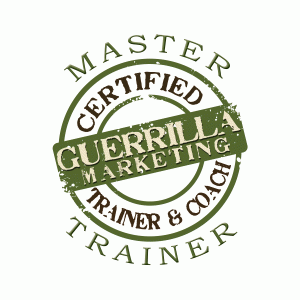The most valuable thing in marketing is a prospects attention. Today we are bombarded by thousands of marketing messages a day. So I ask you, is it better to barge in, capture someone’s attention and annoy them and have them have a negative feeling about us. Or, is it wiser to get them to give us permission to communicate with them and give them something of value with each communication? I am a Master Trainer with Jay Conrad Levinson’s Guerrilla Marketing International. Here is what Jay and Seth Godin, a Guru on new media, have to say about the subject….
The Importance of Permission
by Jay Conrad Levinson
Sometimes the student becomes the teacher. That’s exactly what happened to me when Seth Godin, co-author of three books with me, authored his own “Permission Marketing: Turning Strangers into Friends and Friends into Customers.” It changed my entire outlook about marketing and can dramatically change the beauty of your bottom line.
Seth, once a student of mine, has now enlightened me to the presence of two kinds of marketing in the world today. The first, most common, most expensive, most ineffective and most old-fashioned, is interruption marketing. That’s when marketing such as a TV commercial, radio spot, magazine or newspaper ad, telemarketing call, or direct mail letter interrupts whatever you’re doing to state its message. Most people pay very little attention to it, now more than ever because there is so much of it and because many minds now unconsciously filter it out.
The opposite of interruption marketing is the newest, least expensive, and most effective kind. It’s called permission marketing — because prospects give their permission for you to market to them.
It works like this. You offer your prospects an enticement to volunteer to pay attention to your marketing. The enticement may be a prize for playing a game. It could be information prospects consider to be valuable. It might be a discount coupon. Perhaps it’s membership to a privileged group such as a frequent buyer club, a birthday club. Maybe it’s entry into a sweepstakes. And it might even take the form of an actual free gift. All you ask in return is permission to market to these people. Nothing else.
Alas, you’ll have to use interruption marketing in order to secure that important permission. And you’ll have to track your costs like crazy, figuring how much it costs you to gain each permission — easily figured by analyzing your media costs divided by number of permissions granted.
Once you’ve embarked upon a permission marketing campaign, you can spend less time marketing to strangers and more time marketing to friends. You
can move your marketing from beyond mere reach and frequency and into the realm of trust.
Once you’ve obtained permission from your prospects, your marketing will take on three exciting characteristics. It will be anticipated, meaning people will actually look forward to hearing from you. It will be personal, meaning the messages are directly related to the prospect. And it will be relevant, meaning you know for sure that the marketing is about something in which the prospect is interested.
Permission marketing is not about share of market, not even about share of mind. Instead, it’s about share of wallet. You find as many new actual customers as you can, then extract the maximum value from each customer. You convert the largest number of prospects into customers, using your invaluable permission to accomplish this. You focus your marketing only on prospects and not on the world at large.
Let’s use an existing coed summer camp as an example of permission marketing in action. The camp uses interruption marketing to run ads at camp fairs and in magazines that feature other ads from summer camps. But the ads do not attempt to sell the summer camp. Instead, they focus solely upon motivating prospects to send for a video and a brochure, thereby securing their permission to accept your marketing with an open mind.
Once the prospects receive the video, they soon see that it, too, does not try to sell the camp. It is geared only to get permission to set up a meeting. But having seen a video of the camp facilities, activities, happy campers and attentive staff, the prospect is all set to say yes to a personal meeting. At the in-person meeting, the sale is closed. And once a camper attends the camp for one summer, chances are pretty darned good he or she will not only stay for several more summers, but also will bring along a brother, a sister, a cousin, a schoolmate or a friend — or all of these.
Notice that the only goal of each step is to expand permission for you to take another step rather than making the ultimate sale. Who uses permission marketing these days? Record clubs. Book clubs. Marketers who offer a free brochure. Even my own website at gmarketing.com offers a daily marketing message for only $3 per year — in affect, gaining permission to market to all those who sign up.
The biggest boon to permission marketing is the internet — but only by those who treat it as an interactive medium and not like TV. As clutter becomes worse, permission becomes more valuable. The moral: since only a limited number of companies within a market niche can secure permission, get moving on your own permission marketing program pronto.
COPYRIGHT 2011 GUERRILLA MARKETING INTERNATIONAL – ALL RIGHTS REVERVED

